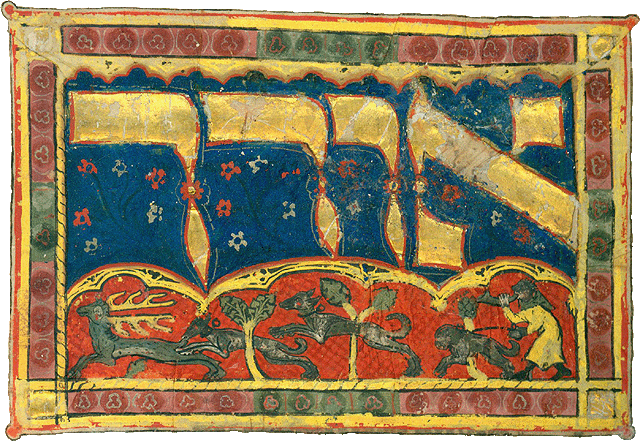The prayer Avinu Malkeinu (Our Father, Our King) is recited after the Amidah (the main prayer, said while standing) and before the Torah service. It is recited throughout the Ten Days of Repentance, from Rosh Hashanah through Yom Kippur, as well as on fast days.
The following short passages explore different aspects of this popular and fascinating prayer. Scroll down to hear the prayer recited.
From Orhot Hayyim
Rabbi Akiva instituted this prayer, as it is stated: “Once Rabbi Eliezer ordered 13 fast days, but no rains fell…. Rabbi Akiva followed him before the Ark and said, ‘Our Father, our King, we have no king but Thee.’ He was immediately answered” (Taanit 25b).
–Orhot Hayyim, Aharon haKohen of Lunel. Reprinted from S. Y. Agnon’s anthology “Days of Awe,” published by Schocken Books.
With your help, My Jewish Learning can provide endless opportunities for learning, connection and discovery.
Our Parent, Our Sovereign?
It can be argued that regular masculine language for God promotes the distinct presumption that though all of us are created in God’s image, some of us are more Godlike than others. In Avinu Malkenu, by retaining the image of Father and King, one might infer that important decisions about life are made, or should be made, by fathers (but not mothers) and kings (not queens).
After all this discussion, it may come as a surprise to discover that it was decided [by the committee of Reform rabbis revising the Reform Mahzor] to retain masculine language for God anyway. Some people held that neutral language virtually does away with the concrete imagery that the Days of Awe demand. Calling God “Our Parent, our Sovereign” here, for example, seemed far more remote, far less compelling, than the traditional “Father” and “King.” Others noted that doing away with “He” and “Him” presented insurmountable problems in translation, which could not be overcome without completely altering the sense of ancient Hebrew passages whose integrity we respected. Would the committee charged with our liturgy vote that way today, if we had it to do again? I doubt it. One’s consciousness of language’s subtle effect on our thinking rises slowly. Nevertheless, it does rise. And today, I think, we would have voted the other way.
–Reprinted from Lawrence A. Hoffman’s “Gates of Understanding 2: Appreciating the Days of Awe,” published by the Central Conference of American Rabbis.
Audio of Avinu Malkeinu (courtesy of Mechon Hadar)
Inscribe Us Five Times
“Our Father, our King, inscribe us in a book.” The five petitions of “Inscribe us in a book” correspond to the Five Books of Moses.
The first, “Inscribe us in the book of happy life” corresponds to the Book of Genesis, in which the creation of all things, meaning life, is spoken of. The second, “Inscribe us in the book of redemption and salvation” corresponds to the Book of Exodus, which speaks of the redemption from Egypt. “Inscribe us in the book of maintenance and sustenance” corresponds to the Book of Leviticus, which speaks of the holy sacrifices and thank-offerings, for the essence of sustenance must be in holiness. “Inscribe us in the book of aiding merit” corresponds to the Book of Numbers, which speaks of the Twelve Tribes that camped near their standards, every tribe being a Chariot to its root, that is to say, to the patriarchs, because of whose aiding merit we are alive. “Inscribe us in the book of forgiveness and pardon” corresponds to the Book of Deuteronomy, in which Moses our master upbraids Israel for all they did that was wrong, and which contains the scriptural portion of teshuvah (repentance), by means of which we merit forgiveness and pardon.
–From Uziel Meisel’s “Tiferet Uziel.” Reprinted from S. Y. Agnon’s anthology “Days of Awe,” published by Schocken Books.
Can I Have That On Credit?
A retail merchant who dealt in fabrics made his way to his wholesale supplier to buy the goods he needed for his business. The wholesaler instructed his workers to wait on the merchant and to bring him all that he ordered. Standing in the middle of the warehouse, the merchant bellowed all sorts of orders and requests.
“I want 1,000 yards of that cloth, 2,000 yards of the blue velvet, 3,000 yards of that white silk,” he shouted, and on and on he went, requesting many other items. When it came time to total up the price of the goods and to pay the bill, the merchant took the wholesaler to the side and, very embarrassed, whispered in his ear: “Listen, I can’t give you any money for this right now. Please allow me credit until I can pay you.”
So it is with us, said the Dubno Maggid. We shout out all sorts of requests to God in the Avinu Malkenu prayer. We want forgiveness, health, a good life, wealth, redemption, and many other things. But when it comes down to the last verse (to pay the bill, so to speak), we whisper: “Our Father, our King, be gracious to us and answer us, though we have no worthy deeds (with which to pay You for our large order) please grant us charity and kindness, and save us.”
–Jacob ben Wolf Kranz, known as the Maggid of Dubno, a Hasidic master and teacher (1741-1804). Reprinted from Aaron Levine’s “The New Rosh Hashanah Anthology,” published by Zichron Meir Publications.
Aharon
Pronounced: ah-ha-RONE, Origin: Hebrew, Aaron in the Torah, brother of Moses.
Rosh Hashanah
Pronounced: roshe hah-SHAH-nah, also roshe ha-shah-NAH, Origin: Hebrew, the Jewish new year.
Torah
Pronunced: TORE-uh, Origin: Hebrew, the Five Books of Moses.
Yom Kippur
Pronounced: yohm KIPP-er, also yohm kee-PORE, Origin: Hebrew, The Day of Atonement, the holiest day on the Jewish calendar and, with Rosh Hashanah, one of the High Holidays.



